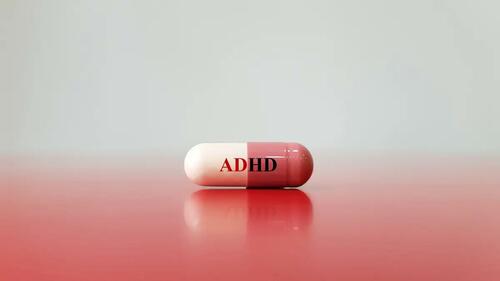
Authored by Amie Dahnke via The Epoch Times (emphasis ours),
A new study indicates that long-term use of attention-deficit/hyperactivity disorder (ADHD) medication may increase the risk of developing cardiovascular disease and that the risk increases the longer the drug is used.

The results of the study conducted in Sweden were published in JAMA Psychiatry, bringing to light the potential risks of long-term ADHD medication.
About 6 million, or 1 in 10, children ages 3 to 17 have been diagnosed with ADHD, according to data from the U.S. Centers for Disease Control and Prevention. Approximately 8.7 million adults in the United States also have ADHD. Individuals with ADHD may have difficulty paying attention, find it hard to sit still, or act without thinking; the symptoms and specifics vary from person to person.
Medication has been the standard treatment of care for decades, researchers wrote, adding that "the use of ADHD medication has increased greatly in both children and adults during the past decades." Medication therapies include stimulant and non-stimulant therapies, with modalities being determined by the patient's needs.
Risk Grows With Duration of Use
In the study, researchers looked at 13 years of records in the National Inpatient Register of over 278,000 individuals between the ages of 6 and 64 with ADHD. They found that the longer an individual used ADHD medication, the higher their risk was of developing cardiovascular disease compared to those who did not take ADHD medication. Additionally, each additional year an individual used ADHD medication increased their risk of heart disease by an average of 4 percent. Overall, the results suggest that heart disease risk was 23 percent higher for people who used ADHD medication for more than five years compared to those who never used it. The risk was stable among children and adults, both male and female.
Cardiovascular diseases linked to ADHD medication include hypertension and artery disease. There was no increased risk for other associated conditions, such as heart failure, arrhythmias, thromboembolic disease, arterial disease, and other forms of heart disease.
The study confirms previous research that indicated patients taking stimulant ADHD medication, such as Ritalin or Adderall, are at higher risk of developing cardiovascular disease than those taking non-stimulant ADHD medication. The reason for the development is likely because the stimulants in the drugs are known to elevate blood pressure, arouse the nervous system, and make the heart work harder.
The study authors noted that clinicians should "be vigilant in monitoring patients ... and consistently assess signs and symptoms of CVD (cardiovascular diseases)," especially in patients receiving high doses of stimulant medications.
Those taking ADHD medication should monitor their heart health regularly. ADHD patients can rely on the American Heart Association's Life's Essential 8, a set of key health behaviors and factors that can alter one's risk of heart disease. The Essential 8 include the following:
- Eating healthily.
- Being more active.
- Quitting smoking.
- Getting enough sleep.
- Managing weight.
- Controlling cholesterol.
- Managing blood sugar.
- Managing blood pressure.
No Proof of Causation
Researchers noted the limitations of the case-control study, including that it cannot prove that ADHD medication causes any cardiovascular disease problems.
Additionally, the study's sample was limited to one country, which could indicate the need for more diversity in the future.
Of prominent note: Researchers did not look at the risk of cardiovascular disease in those who already had heart issues.
The authors indicated that further research must be done that examines those with preexisting cardiovascular disease. "Evaluating the risk among them necessitates a different study design that carefully considers the potential impact of prior knowledge and periodic monitoring," they wrote.
Authored by Amie Dahnke via The Epoch Times (emphasis ours),
A new study indicates that long-term use of attention-deficit/hyperactivity disorder (ADHD) medication may increase the risk of developing cardiovascular disease and that the risk increases the longer the drug is used.

The results of the study conducted in Sweden were published in JAMA Psychiatry, bringing to light the potential risks of long-term ADHD medication.
About 6 million, or 1 in 10, children ages 3 to 17 have been diagnosed with ADHD, according to data from the U.S. Centers for Disease Control and Prevention. Approximately 8.7 million adults in the United States also have ADHD. Individuals with ADHD may have difficulty paying attention, find it hard to sit still, or act without thinking; the symptoms and specifics vary from person to person.
Medication has been the standard treatment of care for decades, researchers wrote, adding that “the use of ADHD medication has increased greatly in both children and adults during the past decades.” Medication therapies include stimulant and non-stimulant therapies, with modalities being determined by the patient’s needs.
Risk Grows With Duration of Use
In the study, researchers looked at 13 years of records in the National Inpatient Register of over 278,000 individuals between the ages of 6 and 64 with ADHD. They found that the longer an individual used ADHD medication, the higher their risk was of developing cardiovascular disease compared to those who did not take ADHD medication. Additionally, each additional year an individual used ADHD medication increased their risk of heart disease by an average of 4 percent. Overall, the results suggest that heart disease risk was 23 percent higher for people who used ADHD medication for more than five years compared to those who never used it. The risk was stable among children and adults, both male and female.
Cardiovascular diseases linked to ADHD medication include hypertension and artery disease. There was no increased risk for other associated conditions, such as heart failure, arrhythmias, thromboembolic disease, arterial disease, and other forms of heart disease.
The study confirms previous research that indicated patients taking stimulant ADHD medication, such as Ritalin or Adderall, are at higher risk of developing cardiovascular disease than those taking non-stimulant ADHD medication. The reason for the development is likely because the stimulants in the drugs are known to elevate blood pressure, arouse the nervous system, and make the heart work harder.
The study authors noted that clinicians should “be vigilant in monitoring patients … and consistently assess signs and symptoms of CVD (cardiovascular diseases),” especially in patients receiving high doses of stimulant medications.
Those taking ADHD medication should monitor their heart health regularly. ADHD patients can rely on the American Heart Association’s Life’s Essential 8, a set of key health behaviors and factors that can alter one’s risk of heart disease. The Essential 8 include the following:
- Eating healthily.
- Being more active.
- Quitting smoking.
- Getting enough sleep.
- Managing weight.
- Controlling cholesterol.
- Managing blood sugar.
- Managing blood pressure.
No Proof of Causation
Researchers noted the limitations of the case-control study, including that it cannot prove that ADHD medication causes any cardiovascular disease problems.
Additionally, the study’s sample was limited to one country, which could indicate the need for more diversity in the future.
Of prominent note: Researchers did not look at the risk of cardiovascular disease in those who already had heart issues.
The authors indicated that further research must be done that examines those with preexisting cardiovascular disease. “Evaluating the risk among them necessitates a different study design that carefully considers the potential impact of prior knowledge and periodic monitoring,” they wrote.
Loading…





